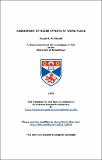Assessment of noise effects at work place
Abstract
Noise is considered to be a physical form of environmental pollution which can
influence the health of exposed persons. Excessive exposure to noise can interfere
with performance at work and with the ability to relax or sleep. Also it may impair
hearing and it can evoke other physiological and pathological symptoms to the
detriment of health. The sources of noise may be local or general. Industrial
processes are an important source of indoor or localised noise. Persons exposed to
noise as a consequence of their employment are legally protected to some extent by
European Directives and National Regulations which limit the maximum permissible
noise levels to 85-90dB. A research project was launched with the full co-operation
of the Don and Low Group of Companies, Forfar and Perth, Scotland.
Study indicates that the proportion of employees who have noise-induced hearing
loss is higher amongst those who work in higher than 85dB, (e.g. Group 1 <85dB-11%;
Group 2 85<90dB-44%; Group 3 90<95dB-44%; Group 4≥95dB-39% = 138% in total). In all groups social and economic status, sex, age and average number of years' service are almost identical.
In general, the study indicates a higher number of employees suffered from ear
problems between groups exposed to 85dB and more, (e.g. perforated eardrum, noise
tinnitus, vertigo, wax in ears).
The danger of noise has been studied in detail regarding the general health of
employees as follows:
1. Sleep disturbance
It appeared that most of the cases who suffered from sleep disturbance were
found amongst employees exposed to greater than 85dB, averaging about 33%.
On the other hand, only 8% of the employees in category <85dB complained
of sleep disturbance.
2. Blood Pressure
According to job categories 10% of employees had heart problems in job
category higher than 85dB, but only one case reported heart problems in job
categories less than 85dB.
3. Stress
Smoking was one of the subjects studied in detail in this project and the results
were significant. An average of 40% of employees were smokers among groups
exposed to higher than 85dB compared to 10% of smokers among employees
exposed to less than 85dB.
Industrial accidents occur at a higher rate among employees who worked in noisy
environments (~85dB) with regard to reported or unreported accidents.
From the result of the research, industrial noise should be studied in a more
comprehensive way to measure all effects of noise regarding employees health by using the statistical data and always noise should be controlled at source.
Industrial noise is still a major danger to employees. From the results in this study it
appears there is a need for more co-operation between employer and employee and
not just depend on the health and safety regulations and try to solve the problem.
Type
Thesis, PhD Doctor of Philosophy
Collections
Items in the St Andrews Research Repository are protected by copyright, with all rights reserved, unless otherwise indicated.

